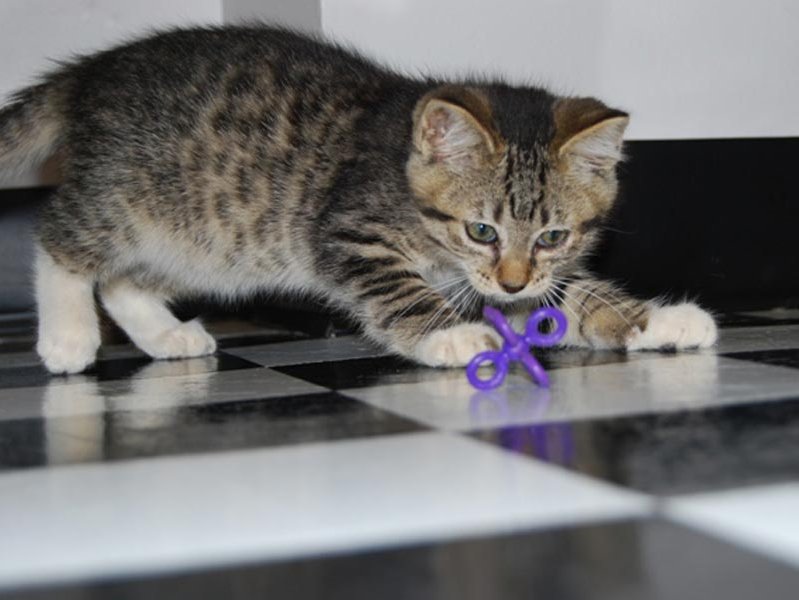If I hadn't seen the X-ray myself, I would not have believed Carson was suffering from a broken leg when he was brought to animal control. And despite our best efforts, we have not been able to convince him!
Carson is a four-month-old brown tabby and white shorthaired kitten. He is very playful and highly social. He loves to cuddle and his purr can be heard from across the room.
Carson is currently not available for adoption. He is on a medical hold and in foster care where we are monitoring the status of his injury to determine if additional procedures will be required. But we have many other canines and felines of all ages and abilities currently looking for a home!
Animals like Carson are incredibly lucky. Upon entrance into the program, they qualify for and have access to top-notch medical care and all services required while awaiting adoption are gladly provided.
We don't fault those who are critical of this approach of providing homeless animals a level of care normally reserved for that of personal pets, but we do ask for it to be respected.
It is sometimes hard to check my initial response when we receive calls wanting to know what a particular pet "goes for" or what we are "asking for." I do concede that most people have no idea what the plight of the homeless entails or that we are even in the middle of an overpopulation crisis, and I do of course realize that they are simply inquiring about the cost of adoption.
But my initial internal response is that they "go for" a fun-loving but structured home that will ensure that all of the needs are met and that we are "asking for" a long term, thoughtful commitment to the adoption process and the patience to allow us to determine appropriate matches for each of the animals we have invested in saving.
Our adoption fee is generally set at $100 for any animal. We do occasionally alter the fee for bonded pair or special needs adoptions, but not very often. When establishing our adoption fee, we could not settle within ourselves setting different payment requirements based on age or species. How do we say that a young animal is "worth" more than one that is considered mature or that a dog has more value than a cat?
Since all of the animals in our program have access to the same level of care and commitment, and give the same level of unconditional love and companionship in return, the fee is generally $100 and includes spay / neuter, vaccinations, microchip and testing for species-specific diseases as well as treatment for any other illness or injury noted prior to adoption.
Our mission directs us to save and serve unclaimed strays from animal control and thankfully for our budget, the large majority of these animals normally don't require more than the basic services to prepare for adoption.
While we always accept adopted animals requiring return to our program at any time for any reason, we are unable to facilitate any other owner-surrendered animals. However, several times each day we receive calls from persons who are moving, having a new baby, diagnosed with a sudden allergy or other situation requiring the immediate need for re-homing of their pet(s).
We do our best to offer assistance to maintain the placement or redirect these callers to facilities or breed-specific rescue agencies that are better equipped to assist. While these calls can be frustrating, they do not compare with those that demand urgent placement of medically or behaviorally challenged pets into a "no-kill" program.
I generally do not check my response to these callers and instead ask them to invest in addressing the needs that are not being met or personally arranging for the euthanasia of the animal. While I am often met with silence or attack from the other end of the line, I try to explain that their lack of commitment by failing to invest in training or medical care does not necessarily mean they are not responsible and ask if they realize what they are actually requesting.
"No-kill" does not necessarily mean that the animal lives out a glorious life at a sanctuary with endless resources. More often than not, "no-kill' can simply mean that the basic needs of food, water and shelter are met. However, the animal usually lives in a confined area for the remainder of his or her life and rarely has their emotional needs satisfied.
In the event that advanced training and medical care have been tried and failed, the kindest resolution can sometimes be euthanasia. It is very hard to find a home for an animal with a medical or behavior challenge with someone who is not already otherwise emotionally invested. Often times those with the best intentions who bravely or naively try, still fail and sometimes an animal such as this might cycle through many homes which in the end is not fair to the people or the animal. Not all animals are safe and sound for placement.
We don't claim to be perfect, but we try very hard to make smart choices. So, when we invest our available resources into ensuring those animals we do place are medically and behaviorally sound, please respect the work we have been tasked to do, ask what you can do to help or get out of the way.
When we take our time to ensure that the match is good and the commitment understood and our philosophies the same, please be thankful and appreciate not only our deep concern we have for the well-being of the animals we place, but also that for your family.
Call (414) 421-8881 or visit www.companionanimal.org for more information.
Amy Christiansen is the Executive Director of the Companion Animal Resource and Adoption Center (CARAC). CARAC is located in the upper level of Southridge Mall and is dedicated to saving the unclaimed strays from the Milwaukee Area Domestic Animal Control Commission.
Amy grew up on the South Side of Milwaukee and now lives in Muskego with her husband and son and their three cats and three dogs. She also takes in the occasional foster dog.



